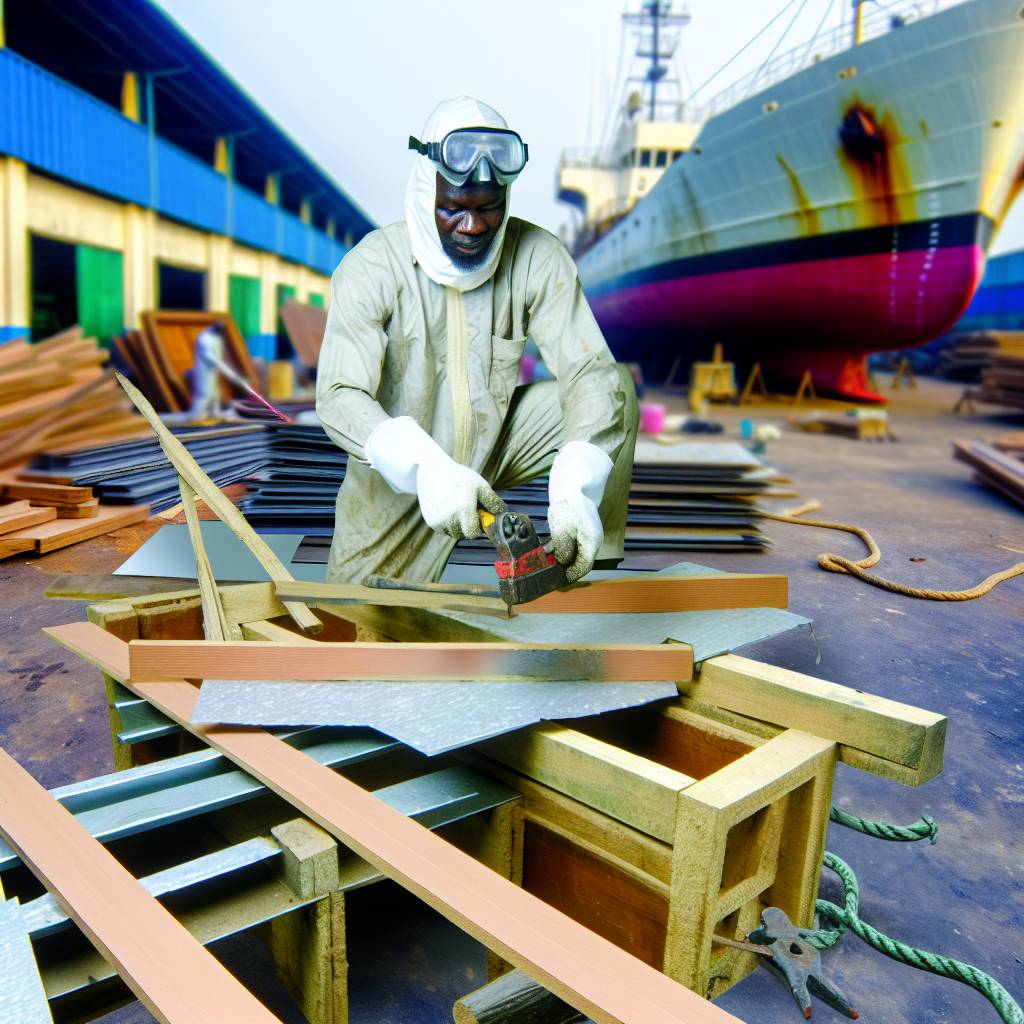Introduction:
Briefly touching on the topic of Nigerian shipbuilding.
It is essential to understand the crucial role that key materials play in this process.
The choice of materials used in constructing a ship determines its quality, durability, and overall performance.
Significance of Key Materials:
The importance of selecting the right materials cannot be overstated in Nigerian shipbuilding.
These materials, such as steel, aluminum, and composite materials, form the foundation of the vessel.
They directly impact its performance at sea.
Contributions to Quality and Durability:
Key materials play a significant role in ensuring the quality and durability of Nigerian ships.
For example, high-quality steel is used in constructing the hull and structural components.
This provides strength and stability to the vessel.
Aluminum is often used for superstructures due to its lightweight and corrosion-resistant properties.
Composite materials offer a unique combination of strength, weight savings, and resistance to harsh marine environments.
This makes them suitable for various components of the ship.
Traditional materials used in Nigerian shipbuilding:
Shipbuilding in Nigeria has a rich history that dates back centuries.
Traditional materials have been at the core of the process.
Local materials such as wood, bamboo, and palm leaves have been extensively used in the construction of boats and ships in Nigeria.
Historical use of local materials:
- Wood: Nigerian shipbuilders have traditionally relied on various types of wood sourced locally, such as mahogany, iroko, and teak.
- Bamboo: Bamboo is another commonly used material in Nigerian shipbuilding due to its strength and flexibility.
- Palm leaves: In some regions of Nigeria, palm leaves are used as roofing material for boats, providing protection from the elements while also adding a traditional touch to the vessels.
Advantages and limitations of using traditional materials:
- Advantages:
- Cost-effective: Local materials are readily available and affordable, making them a sustainable choice for shipbuilding.
- Cultural significance: Using traditional materials helps preserve Nigeria’s maritime heritage and craftsmanship.
- Natural properties: Materials like wood offer inherent strength and flexibility, ideal for marine applications.
- Cost-effective: Local materials are readily available and affordable, making them a sustainable choice for shipbuilding.
- Limitations:
- Weight: Traditional materials may be heavier than modern alternatives, impacting the vessel’s speed and fuel efficiency.
- Vulnerability to decay: Wood and bamboo are susceptible to rot and deterioration over time, requiring regular maintenance.
- Limited availability: Some traditional materials may be scarce or difficult to procure in sufficient quantities for large-scale shipbuilding projects.
- Weight: Traditional materials may be heavier than modern alternatives, impacting the vessel’s speed and fuel efficiency.
Cultural significance of traditional materials:
For Nigerian shipbuilders, the use of traditional materials goes beyond practical considerations.
It is imbued with cultural significance and symbolism.
Wood, bamboo, and palm leaves are deeply rooted in Nigerian traditions.
They reflect the nation’s close connection to its natural resources.
Incorporating these materials in shipbuilding practices honors the craftsmanship of past generations.
It preserves indigenous knowledge that has been passed down through the ages.
By utilizing traditional materials, Nigerian shipbuilders pay tribute to their heritage.
They contribute to the continuity of a time-honored craft.
Modern materials used in Nigerian shipbuilding:
- Steel
- Aluminum
- Fiberglass
Shift Towards Modern Materials
In recent years, Nigerian shipbuilding has seen a significant shift towards using modern materials such as steel, aluminum, and fiberglass.
This shift has been driven by the need to improve the quality and competitiveness of Nigerian ships in the global market.
Advantages of Modern Materials
One of the key advantages of using modern materials in shipbuilding is their superior strength.
Steel, aluminum, and fiberglass are known for their high tensile strength, making them ideal for building sturdy and durable ships that can withstand harsh maritime conditions.
Furthermore, these materials offer excellent corrosion resistance, especially in saltwater environments.
This property ensures that the ships remain in top condition for a longer period, reducing maintenance costs and downtime.
Another advantage of modern materials is their lightweight nature.
Aluminum and fiberglass are significantly lighter than traditional materials like wood, which translates to increased fuel efficiency and reduced operating costs for shipowners.
Improved Quality and Competitiveness
The adoption of modern materials in Nigerian shipbuilding has greatly improved the quality of the ships produced.
Ships built with steel, aluminum, and fiberglass boast higher structural integrity, improved performance, and enhanced safety features, meeting international standards and regulations.
Moreover, the use of modern materials has made Nigerian ships more competitive in the global market.
With increased strength, durability, and efficiency, Nigerian shipbuilders can now offer high-quality vessels at competitive prices, attracting more clients and expanding their market reach.
Uncover the Details: Top Schools for Applied Math and Statistics in Nigeria
Challenges in sourcing key materials:
Challenges in sourcing key materials:
- Difficulty in finding quality raw materials locally
- High costs associated with importing materials
- Limited availability of specialized materials in Nigeria
- Inconsistent supply chain for essential shipbuilding materials
Implications of relying on imported materials:
Implications of relying on imported materials:
- Increased project costs due to import duties and shipping fees
- Dependency on foreign suppliers can lead to delays in construction
- Risk of fluctuations in exchange rates affecting material prices
- Lack of control over the quality and timeliness of imported materials
Potential solutions to address material sourcing issues:
Potential solutions to address material sourcing issues:
- Encouraging local production of key shipbuilding materials
- Investing in research and development for innovative material alternatives
- Establishing strategic partnerships with reliable international suppliers
- Improving infrastructure to facilitate efficient material distribution
Supply chain management in the Nigerian shipbuilding industry:
Supply chain management in the Nigerian shipbuilding industry:
Transform Your Career with Expert Guidance
Get personalized mentorship consulting that’s tailored to your unique path. Our expert advice is actionable and exclusive.
Get Started- Streamlining procurement processes to reduce lead times
- Implementing inventory management systems to track material usage
- Utilizing local sourcing networks to enhance material availability
- Training personnel in supply chain best practices for efficiency
By addressing the challenges in material sourcing and enhancing supply chain management, Nigerian shipbuilders can improve their competitiveness and sustainability in the global market.
Learn More: Applied Math Internships and Job Placements in Nigeria
Sustainability and Environmental Concerns
Environmental Impact of Using Certain Materials
The materials used in shipbuilding significantly affect the environmental impact of the industry.
Traditional metals like steel and aluminum are associated with negative environmental effects.
Their extraction and manufacturing processes contribute to greenhouse gas emissions.
Mining, transportation, and energy-intensive production processes cause environmental degradation.
Importance of Adopting Sustainable Practices
Due to these environmental concerns, the Nigerian shipbuilding industry must adopt sustainable practices.
Using eco-friendly materials is essential for reducing carbon footprints.
This transition is vital for both the environment and the industry’s long-term viability.
Initiatives and Regulations for Environmentally Responsible Shipbuilding
Various initiatives and regulations promote environmentally responsible shipbuilding in Nigeria.
These include requirements for using environmentally friendly materials and waste management protocols.
Emissions control measures and certification programs support adherence to environmental standards.
- Implementation of strict environmental impact assessments for shipbuilding projects
- Promotion of renewable energy sources and alternative materials
- Integration of waste recycling and sustainable waste management practices
- Establishment of green building guidelines and standards for ship construction
- Collaboration with international organizations to exchange best practices and technologies
Sustainability and environmental concerns are crucial in the Nigerian shipbuilding industry.
By adopting eco-friendly materials and practices, Nigeria can achieve a sustainable shipbuilding sector.
This transition will benefit both the industry and the environment.
Delve into the Subject: Applied Chemistry Conferences and Workshops in Nigeria

Innovations in Material Technology:
Over the years, the field of material technology has witnessed significant advancements that have paved the way for innovation in shipbuilding.
One of the key areas of focus has been the development of lightweight yet durable materials that can withstand harsh marine environments.
These materials play a crucial role in enhancing the performance and longevity of ships, making them more efficient and cost-effective.
In Nigeria, the shipbuilding industry is experiencing a transformation driven by innovation in materials science.
The adoption of new materials and techniques is revolutionizing the way ships are designed and built in the country.
This shift towards advanced materials is not only improving the quality and performance of Nigerian ships but also opening up new opportunities for growth and development in the industry.
One notable example of new materials being used in Nigerian shipbuilding is aluminum.
Aluminum alloys are becoming increasingly popular due to their high strength-to-weight ratio and corrosion resistance.
These properties make aluminum an attractive choice for building lightweight yet sturdy ship structures.
In addition, composite materials, such as carbon fiber reinforced polymers, are also being utilized to create stronger and more durable ship components.
Another exciting development in material technology is the use of advanced coatings and paints that protect ships from corrosion and fouling.
These coatings help extend the lifespan of ships by preventing damage caused by exposure to seawater and marine organisms.
By incorporating these innovative solutions into shipbuilding practices, Nigerian shipbuilders can ensure that their vessels remain in top condition for longer periods.
This approach reduces maintenance costs and downtime.
Furthermore, advancements in sustainable materials are gaining traction in the Nigerian shipbuilding industry.
Eco-friendly materials, such as recycled plastics and bio-based composites, are being explored as alternatives to traditional shipbuilding materials.
These sustainable options not only help reduce the environmental impact of shipbuilding activities.
They also align with global efforts to promote green technologies and practices in the maritime sector.
By embracing these innovations, Nigerian shipbuilders can contribute to a more sustainable future for the industry and support the country’s transition towards a greener economy.
Explore Further: Industry Trends Influencing Applied Biology in Nigeria
Collaboration and knowledge exchange:
Explore the importance of collaboration with international partners and experts
Collaboration with international partners and experts is crucial in accessing cutting-edge materials and technologies in shipbuilding.
It allows Nigerian shipbuilders to tap into a pool of knowledge and expertise that may not be readily available locally.
By working with international partners, Nigerian shipbuilders can leverage their experience and learn new techniques to improve their capabilities.
Discuss the potential benefits of knowledge exchange and technology transfer
Knowledge exchange and technology transfer play a vital role in advancing Nigerian shipbuilding capabilities.
Through these processes, local shipbuilders can acquire new skills, methodologies, and technologies that can enhance their competitiveness.
By learning from international partners, Nigerian shipbuilders can stay abreast of the latest trends and developments in the industry.
Highlight successful collaborations or partnerships that have contributed to the development
Several successful collaborations have significantly contributed to the development of the Nigerian shipbuilding industry.
Partnerships with established shipbuilders from countries like South Korea, China, and Japan have led to technology transfer and knowledge sharing.
These collaborations have resulted in the introduction of advanced materials and construction techniques, elevating the quality of Nigerian-built ships.
Key Materials in Nigerian Shipbuilding
The key materials used in Nigerian shipbuilding are crucial for the industry’s growth.
Key Points Summary
- Marine-grade steel, aluminum, and composite materials are commonly used in Nigerian shipbuilding.
- These materials are essential for building sturdy and reliable vessels that can withstand harsh marine conditions.
- Local availability of raw materials like steel and aluminum further supports the shipbuilding industry’s growth in Nigeria.
- Collaboration with international suppliers for specialized materials ensures the high quality of Nigerian-built ships.
Significance of Key Materials
The utilization of key materials in Nigerian shipbuilding plays a vital role in enhancing the country’s maritime capabilities.
These materials enable local shipbuilders to construct vessels that meet international standards and improve Nigeria’s global competitiveness.
Future Prospects and Challenges
Looking ahead, the Nigerian shipbuilding industry has significant potential for growth and development.
However, challenges such as limited infrastructure, skilled labor shortage, and reliance on imported materials must be addressed.
By overcoming these challenges and investing in research and development, Nigeria can strengthen its position in the global shipbuilding market.
Additional Resources
Barriers to Technology Adoption Among Maritime Industry …
Oil, fisheries and coastal communities: A review of impacts on the …




